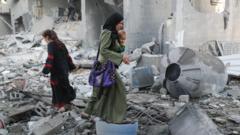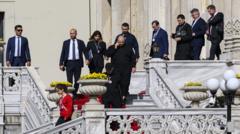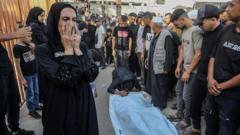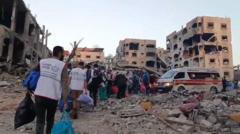Amid escalating conflict, Hamas has responded to a U.S. ceasefire proposal, indicating readiness to release Israeli hostages but seeking significant revisions to the plan.
Hamas Offers Hostage Deal Amidst Complex Ceasefire Negotiations

Hamas Offers Hostage Deal Amidst Complex Ceasefire Negotiations
Hamas proposes changes to the US ceasefire plan while suggesting a potential hostage release in a challenging political climate.
In a dramatic turn of events, Hamas indicated its willingness to release 10 living Israeli hostages and 18 deceased hostages, contingent on assurances regarding Palestinian prisoners' exchanges. However, the group has also laid out additional demands for a permanent ceasefire, total Israeli withdrawal from Gaza, and a consistent flow of humanitarian aid—none of which currently align with the U.S. proposal.
This diplomatic maneuver is not a full acceptance of the U.S. terms, which have reportedly been accepted by Israel. The U.S. special envoy for the Middle East, Steve Witkoff, stated that Hamas' response was unacceptable, asserting that it should adhere to the proposed framework to facilitate talks. In stark contrast, Israeli Prime Minister Benjamin Netanyahu's office reiterated that while they are prepared to negotiate hostages' release, Hamas continues to reject the updated outlines.
Hamas finds itself in a precarious position, navigating intense public pressure from the severely affected 2.2 million residents of Gaza while recognizing that the current U.S. offer is less favorable than previous arrangements they declined. Under the threat of an escalating Israeli ground offensive, Hamas’s ability to resist is waning.
The specifics of the U.S. ceasefire plan remain largely under wraps, but purported components include a 60-day cessation of hostilities, with incremental releases of Israeli hostages and Palestinian prisoners, alongside a structured intervention to provide humanitarian aid to Gaza.
However, it's unclear if Netanyahu is open to negotiating critical changes as he remains focused on ensuring the safety of hostages while preparing Israel’s military response. Defence Minister Israel Katz has emphasized a hardline stance, indicating that Hamas must either accept the terms or face annihilation.
In response, Hamas officials have expressed frustration over perceived biases in the negotiation processes, claiming that any Israeli responses contradict their agreements with U.S. mediators.
The situation is dire, with the Hamas-run health ministry reporting significant casualties due to ongoing Israeli bombardments, further emphasizing the urgent humanitarian crisis engulfing the region.
This diplomatic maneuver is not a full acceptance of the U.S. terms, which have reportedly been accepted by Israel. The U.S. special envoy for the Middle East, Steve Witkoff, stated that Hamas' response was unacceptable, asserting that it should adhere to the proposed framework to facilitate talks. In stark contrast, Israeli Prime Minister Benjamin Netanyahu's office reiterated that while they are prepared to negotiate hostages' release, Hamas continues to reject the updated outlines.
Hamas finds itself in a precarious position, navigating intense public pressure from the severely affected 2.2 million residents of Gaza while recognizing that the current U.S. offer is less favorable than previous arrangements they declined. Under the threat of an escalating Israeli ground offensive, Hamas’s ability to resist is waning.
The specifics of the U.S. ceasefire plan remain largely under wraps, but purported components include a 60-day cessation of hostilities, with incremental releases of Israeli hostages and Palestinian prisoners, alongside a structured intervention to provide humanitarian aid to Gaza.
However, it's unclear if Netanyahu is open to negotiating critical changes as he remains focused on ensuring the safety of hostages while preparing Israel’s military response. Defence Minister Israel Katz has emphasized a hardline stance, indicating that Hamas must either accept the terms or face annihilation.
In response, Hamas officials have expressed frustration over perceived biases in the negotiation processes, claiming that any Israeli responses contradict their agreements with U.S. mediators.
The situation is dire, with the Hamas-run health ministry reporting significant casualties due to ongoing Israeli bombardments, further emphasizing the urgent humanitarian crisis engulfing the region.




















